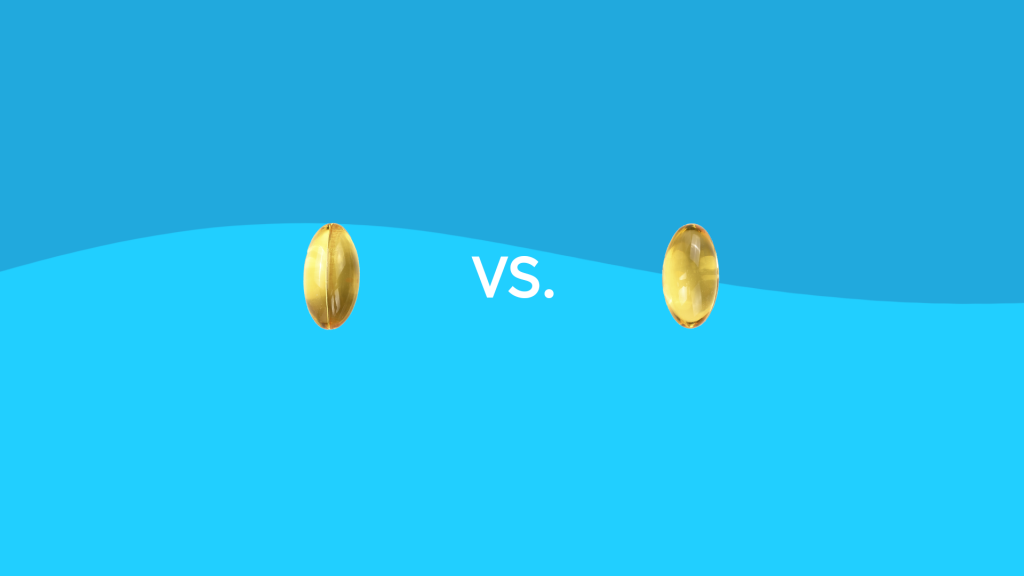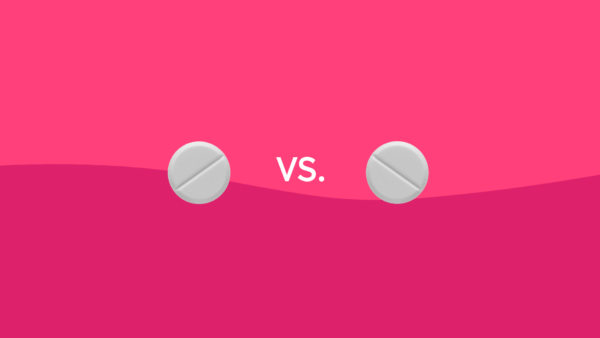Drug overview & main differences | Conditions treated | Efficacy | Insurance coverage and cost comparison | Side effects | Drug interactions | Warnings | FAQ
Colace and Dulcolax are two over-the-counter (OTC) medications that help treat constipation. Constipation is a gastrointestinal condition characterized by having three or fewer bowel movements per week, hard or lumpy stools, stools that are difficult to pass, or the feeling that you have not completely passed the stool. Bowel habits do vary from person to person. Patients experiencing constipation may describe the feeling of bloating or pressure in their bowels.
Constipation is common and can affect infants, children, and adults. It is estimated that 16 out of every 100 Americans suffer from constipation. There are certain groups of patients who tend to suffer from more constipation. These include older adults, women, non-Caucasians, patients who eat a low-fiber diet, and patients on certain other medications.
While this article will only compare Colace and Dulcolax, there are obviously a variety of over-the-counter laxatives. Seek the medical advice of a healthcare professional to determine which type of laxative one may be right for you.
What are the main differences between Colace and Dulcolax?
Colace (docusate sodium) is an over-the-counter medication used to treat and relieve the symptoms of constipation. Colace acts as a surfactant and lowers the surface tension of oil and water in the stool. This allows lipids and moisture to penetrate the stool, producing a softer stool that can move more easily through the gastrointestinal tract. Colace is classified as a stool softener but is not considered a laxative because it does not directly stimulate motility. It may take one to three days for stool softening to occur therefore Colace will not typically provide quick relief of constipation symptoms. Colace (What is Colace?) is available in 50 mg and 100 mg oral softgel capsules, and 10 mg/ml and 60 mg/15ml oral solutions. There are also glycerin suppositories and stool softener and laxative combinations available under the Colace trade name.
Want the best price on Colace?
Sign up for Colace price alerts and find out when the price changes!
Dulcolax (bisacodyl EC) is an over-the-counter medication used to treat and relieve the symptoms of constipation. Dulcolax is a laxative and works by directly stimulating peristaltic movement by irritating the mucosa of the intestine. This stimulation physically moves the stool through the tract. Dulcolax produces its desired effect more quickly than Colace, typically within 8-12 hours with oral administration. Dulcolax (What is Dulcolax?) is available in enteric-coated 5 mg and 10 mg tablets as well as a 10mg rectal suppository. There are stool softeners and other products available under the Dulcolax trade name.
| What are the main differences between Colace and Dulcolax? | ||
|---|---|---|
| Colace | Dulcolax | |
| Drug class | Stool softener | Stimulant laxative |
| Brand/generic status | Brand and generic available | Brand and generic available |
| What is the generic name? | Docusate sodium | Bisacodyl EC |
| What form(s) does the drug come in? | Oral softgel, oral solution | Oral enteric-coated tablets, rectal suppository |
| What is the standard dosage? | One 100 mg softgel twice daily, max 300 mg per day | One 10 mg suppository once daily, max of 3 days per week |
| How long is the typical treatment? | One week or less, unless otherwise directed by a healthcare provider | One week or less, unless otherwise directed by a healthcare provider |
| Who typically uses the medication? | Children 2 years of age and older, adults | Children 6 years of age and older, adults |
Conditions treated by Colace and Dulcolax
Colace is indicated in both the treatment of constipation and its prevention. Occasional constipation should resolve within one week. Colace is generally safe to be taken long term with the guidance of a healthcare provider and may be prescribed to prevent constipation associated with other medications or conditions known to cause constipation.
Dulcolax is indicated only in the treatment of occasional constipation. Its mechanism of stimulating motility may cause some discomfort. It should only be used for up to one week unless otherwise directed by a healthcare professional.
| Condition | Colace | Dulcolax |
| Prevention of constipation | Yes | No |
| Treatment of constipation | Yes | Yes (occasional) |
Is Colace or Dulcolax more effective?
The active ingredients in Colace and Dulcolax have not been compared in a direct comparison clinical trial for efficacy in treating constipation.
There are several factors about each drug to keep in mind when selecting what is right for you. One factor would be how quickly you expect relief. Dulcolax suppositories typically work within a few hours but may cause some discomfort. Dulcolax tablets typically provide relief overnight, within 8 to 12 hours. Colace may take one to three days to produce a bowel movement.
Dosage form is an important factor as well. For some patients, inserting a rectal suppository may be difficult or more uncomfortable than they can stand. While suppositories work quickly, patients may prefer to take an oral dosage form.
Only your healthcare professional can decide what is right for you. Colace and Dulcolax should not be taken for more than one week without the consent of a doctor.
Coverage and cost comparison of Colace vs. Dulcolax
Colace is an over-the-counter medication that is typically not covered by commercial or Medicare drug insurance plans. On average, a bottle of Colace will cost over $15. If you have a prescription you could pay as little as $4.26 with a coupon from SingleCare.
Get the SingleCare prescription discount card
Dulcolax is an over-the-counter medication that is typically not covered by commercial or Medicare drug insurance plans. The average retail price of a 12-count box of Dulcolax suppositories is almost $12. You could pay as little as $6.10 with this coupon from SingleCare, if you get a prescription from your healthcare provider.
| Colace | Dulcolax | |
| Typically covered by insurance? | No | No |
| Typically covered by Medicare Part D? | No | No |
| Standard dosage | 100, 100 mg softgels | 12, 10 mg suppositories |
| Typical Medicare copay | N/A | N/A |
| SingleCare cost | $4-$14 | $5-$15 |
Common side effects of Colace vs. Dulcolax
Adverse events are rare with Colace. Mild gastrointestinal cramping may occur. With higher doses and/or prolonged use, diarrhea and loose stools may occur. The liquid preparation may cause irritation to the lining of the throat if not diluted per manufacturer’s instructions.
Dulcolax at normal doses for short durations of treatment may cause mild gastrointestinal cramping, faintness, nausea, and vomiting. Dulcolax used long term is likely to cause diarrhea and lead to fluid and electrolyte loss. This can lead to hypokalemia (low potassium levels) which may be dangerous. Prolonged use can also lead to dependency, and rebound constipation may occur when the medication is stopped.
This list may not include all potential side effects. Please consult your healthcare professional for a complete list.
| Colace | Dulcolax | |||
| Side effect | Applicable? | Frequency | Applicable? | Frequency |
| Gastrointestinal cramping | Yes | Not defined | Yes | Not defined |
| Diarrhea | Yes | Not defined | Yes | Not defined |
| Faintness | No | N/A | Yes | Not defined |
| Nausea | No | N/A | Yes | Not defined |
| Vomiting | No | N/A | Yes | Not defined |
| Electrolyte imbalance | No | N/A | Yes | Not defined |
Source: Colace (DailyMed) Dulcolax (DailyMed)
Drug interactions of Colace vs. Dulcolax
Colace and Dulcolax should be used cautiously in patients on loop diuretics such as furosemide or torsemide. These diuretics are potassium wasting, and that potassium loss combined with the potential electrolyte imbalance that can result from diarrhea when taking Colace or Dulcolax could lead to hypokalemia.
Colace should not be taken with mineral oil because it can increase systemic absorption of mineral oil. Inflammation of the intestine, liver, spleen, and lymph nodes could occur from mineral oil deposits at these sites leading to a foreign body reaction.
Dulcolax is enteric coated and designed to have delayed dissolution. Taking Dulcolax with antacids, H2 blockers, and proton inhibitors may cause the enteric coating to dissolve prematurely leading to stomach irritation or dyspepsia. Dulcolax should be spaced away from the administration of these drugs by at least one hour.
This is not intended to be an all-inclusive list of potential drug interactions. Please consult your pharmacist or healthcare professional for a complete list.
| Drug | Drug class | Colace | Dulcolax |
| Aluminum hydroxide Magnesium hydroxide Sodium bicarbonate Calcium carbonate |
Antacids | No | Yes |
| Diphenoxylate | Antidiarrheal | No | Yes |
| Hydrocodone | Opiate pain reliever | No | Yes |
| Cimetidine Famotidine Ranitidine Nizatidine |
H2 Blockers | No | Yes |
| Furosemide Torsemide |
Loop diuretics | Yes | Yes |
| Lactulose Polyethylene glycol Mineral oil |
Laxatives | Yes | Yes |
| Esomeprazole Omeprazole Pantoprazole Rabeprazole Lansoprazole |
Proton pump inhibitors | No | Yes |
Warnings of Colace and Dulcolax
You should consult your doctor before using Colace or Dulcolax if you are experiencing nausea, vomiting, or stomach pain. You should also consult your healthcare provider if you have had a sudden change in bowel movements that have lasted for more than two weeks.
When taking Dulcolax, cramping and abdominal discomfort may occur. Do not crush or chew Dulcolax tablets, and do not take Dulcolax within one hour of antacids or milk. If you have no bowel movement or experience rectal bleeding after taking Dulcolax, stop taking it and call your doctor.
Frequently asked questions about Colace vs. Dulcolax
What is Colace?
Colace is an over-the-counter stool softener used in the prevention and treatment of constipation. Colace is available in 50 mg and 100 mg oral softgel capsules, and 10 mg/ml and 60 mg/15ml oral solutions.
What is Dulcolax?
Dulcolax is a stimulant laxative used in the treatment of occasional constipation. Dulcolax is available in enteric-coated 5 mg and 10 mg tablets as well as a 10mg rectal suppository.
Are Colace and Dulcolax the same?
While both Colace and Dulcolax are used to treat constipation, they are not the same and do not work in the same way. Colace, a stool softener, helps soften the stool to make it easier to pass. Dulcolax, a stimulant laxative, works by simulating the physical movement of the stool through the digestive tract.
Is Colace or Dulcolax better?
Dulcolax produces a bowel movement more quickly than Colace, with the suppository form working within an hour or so of administration. Colace is typically gentler and causes less discomfort, but may take up to three days to provide relief.
Can I use Colace or Dulcolax while pregnant?
The Food and Drug Administration (FDA) has not assigned a pregnancy safety category to Colace. Colace has been associated with some cases of fetal malformation, and therefore should only be used when benefits clearly outweigh the risks. Dulcolax has not shown any undesirable effects and is considered relatively safe for short term use in pregnancy. The risk of dehydration and electrolyte imbalance should be weighed when deciding on constipation treatment in pregnant women, and their healthcare provider should always be consulted.
Can I use Colace or Dulcolax with alcohol?
While there are no direct interactions with alcohol, the effects of alcohol on the digestive system may increase the risk of dehydration, and caution should be used when taking Colace or Dulcolax while consuming alcohol.
Is Dulcolax a stool softener?
Dulcolax formulations containing bisacodyl are considered stimulant laxatives, not stool softeners. There are stool softeners available under the Dulcolax trade name.
What is the difference between a stool softener and a laxative?
A stool softener works by decreasing the surface tension of oil and water in the stool. This draws extra moisture into the stool, making it softer and easier to pass. Laxatives work by physically increasing the motility of the digestive tract, which mechanically moves the stool through the digestive tract.
Is it safe to take a stool softener every day?
Stool softeners can be taken every day under the supervision of a healthcare professional for the prevention and treatment of chronic constipation. It is important to monitor for signs of dehydration and ongoing diarrhea.
Sources
- Definition & Facts for Constipation, National Institute of Diabetes and Digestive and Kidney Diseases (2018)
- Colace Drug Label, DailyMed





